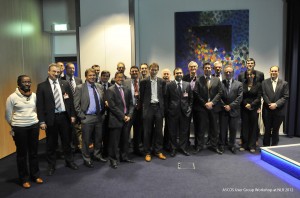 A European Union project called ASCOS recently got underway. The purpose of the project is to make flying even safer by improving the certification of new safety systems and air traffic operations. NLR, the project leader, organised a meeting for the users group on Tuesday 30 October 2012. The group includes regulatory bodies (such as EASA, FAA, the Netherlands Ministry of Infrastructure and the Environment), the SESAR Joint Undertaking, air safety working parties, the aircraft manufacturing industry and air-traffic controllers. They were informed of the progress of the project, its key phases, the expected results and the targeted safety improvements.
A European Union project called ASCOS recently got underway. The purpose of the project is to make flying even safer by improving the certification of new safety systems and air traffic operations. NLR, the project leader, organised a meeting for the users group on Tuesday 30 October 2012. The group includes regulatory bodies (such as EASA, FAA, the Netherlands Ministry of Infrastructure and the Environment), the SESAR Joint Undertaking, air safety working parties, the aircraft manufacturing industry and air-traffic controllers. They were informed of the progress of the project, its key phases, the expected results and the targeted safety improvements.
ASCOS is seeking to improve and speed up the process of certificating safety-enhancing operations and systems. The object is to fine-tune the process, putting an emphasis on the human dimension. Ruling out human errors early in the certification process makes it possible to avoid problems at a later stage. An all-embracing approach has been adopted to ASCOS by integrally examining all aviation systems. An advantage of this approach is that ASCOS will provide important input for the European Commission’s strategic vision as set out in its ‘ACARE Vision 2020’ report. Two objectives defined by the EC for 2020 are to cut by eighty percent the number of air traffic accidents and to reduce significantly the consequences of human errors. COS will make flying even safer.
ASCOS is part of the EU’s 7th Framework Programme for Transport – Aeronautics and Air Transport (AAT). The total cost of this project is EUR 4,702,893, with the EU contributing EUR 3,365,884. The project will take 36 months to complete. Fourteen organisations and companies from the Netherlands and other EU member states are taking part. Dutch participants include NLR, Delft University of Technology, CertiFlyer and Thales.

